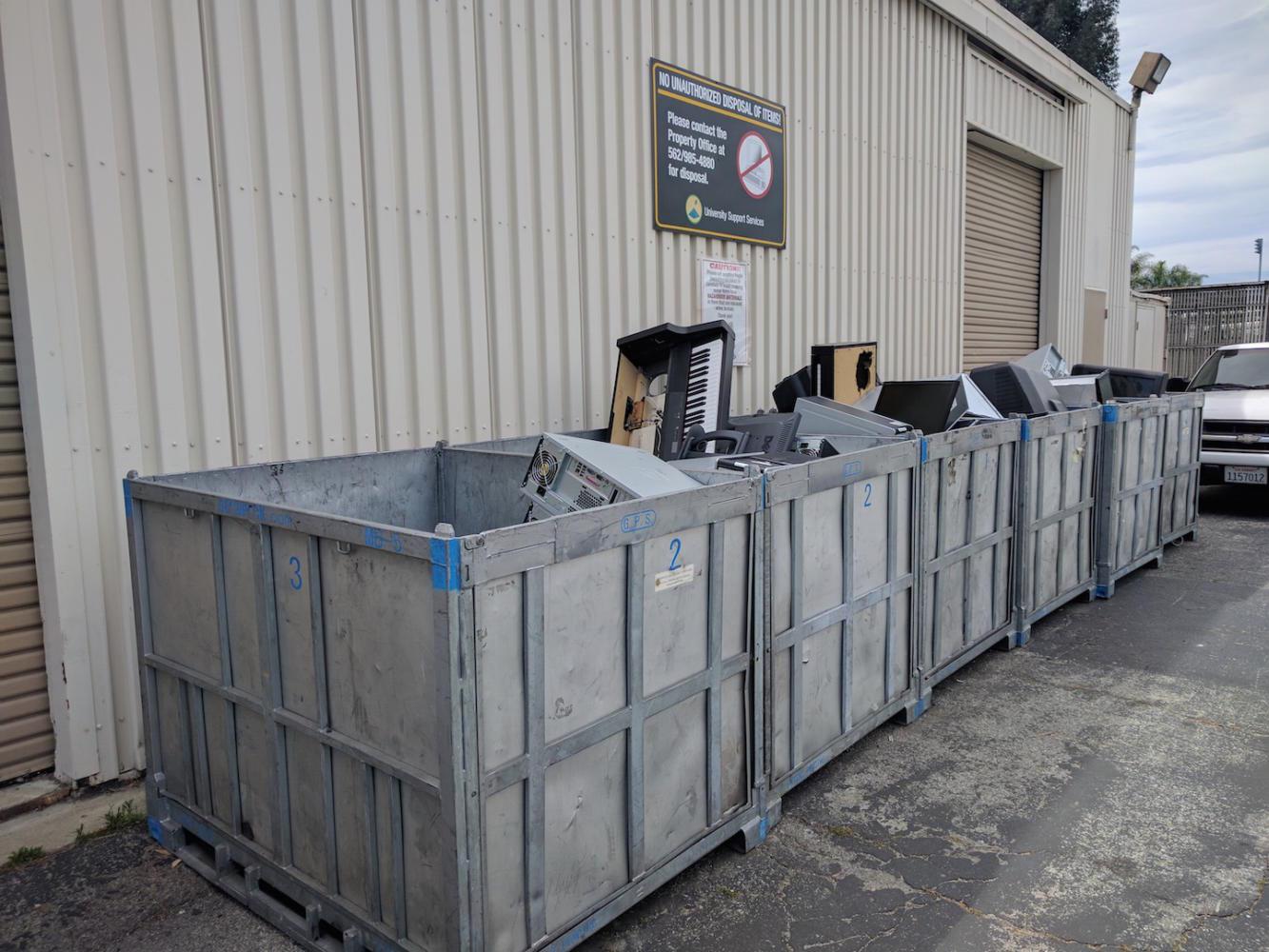A professor’s computer breaks and is unfixable. Where does it go next? It can’t get tossed in the trash because it’s electronic waste. So, what happens to these electronics when they’re obsolete, broken or just no longer needed?
Cal State Long Beach recycles an average of 24,000 to 36,000 pounds annually, according to Christopher Ramirez, Support Services Manager at CSULB.
The trail starts with a department’s technology coordinator, who would send a broken piece of equipment to their perspective college’s Technical Services. Each college has a person within the department responsible for processing e-waste. That person would then send the equipment down to Gary Corbin in Property Management in the shipping and receiving area on lower campus with a “survey request.”
“It has to be certified by the customer [the technology specialist] that it’s cleaned [and] there’s no info or data on it — it has to be media sanitized,” Corbin said.
There, the e-waste is processed and placed into bins for Global eRecyclers to pick up, which happens about every two weeks. The company pays CSULB for the e-waste by the pound. They have been picking up CSULB’s e-waste for 11 years.
According to Ramirez, CSULB earned $1,424.80 in 2014, $1,032.40 in 2015 and $542.09 in 2016. He noted the decrease in revenue.
“The downward trend could be for people being more sustainability-conscious, but also that computers are purchased every 3-5 years and it could be between purchase times,” he said in an email.
According to Corbin, if the item is reuseable, he may hold onto it for awhile to see if anyone can use it. Even if the technology is obsolete, a technical specialist on campus may reach out to him to use parts of it to repair something else.
“Everything is sustainable, everything can be recycled,” Corbin said.
Like every trail, there’s a beginning, and with almost every purchase the campus makes, the Procurement department plays a big role.
CSULB spends, on average, about $7 million per year on electronic products, according to Malia Kinimaka, director of procurement and contractual services. For the last three semesters, Kinimaka has been working on sustainable procurement policies.
Kinimaka said the new policies got started when she became part of CSULB Sustainability Taskforce. Other departments such as Transportation and Facilities were working on sustainable policies for their departments.
“I thought, ‘How can procurement make an impact on this as well?’ And when I started to research our own procurement policies [on sustainability], I found that we had none,” Kinimaka said. “We had a policy from the [Chancellor’s Office] that encourages sustainability, but doesn’t mandate it, so I found that in order to achieve the results we’re looking for, we do need to put some mandated policies in place to make sure that happens.”
The two policies are in draft right now, with one requiring that printer paper be made from 30 percent recyclable material and the other to enforce that any technology products purchased on campus have an EPEAT bronze rating.
EPEAT is a “free source of environmental product ratings that makes it easy to select high-performance electronics that support organizations’ IT and sustainability goals” according to its website, and is similar to an EnergyStar rating for appliances.
Kinimaka did a survey of 30 campus technology coordinators who are responsible for purchasing technology on campus and found the majority didn’t know if the products they were buying were EPEAT qualified.
“It would be nice to have a base line and really track what we’re buying and how much of it is [EPEAT] qualified so that we can assess our impact on the environment based on what we’re buying,” she said.
Kinimaka said that the majority of the technology brands that the campus already buys, like Dell, HP and Apple, have EPEAT rated products.
She also noted that CSU Northridge and CSU Los Angeles both have environmental policies.
“That’s why my whole focus is on creating policy, because if you don’t have the policy in place, people aren’t going to be forced to do it,” Kinimaka said.
The policies have been approved by the campus Sustainability Task Force and will be reviewed by the Vice President of Finance for further approval and will eventually make it to President Jane Close Conoley to sign off on.




